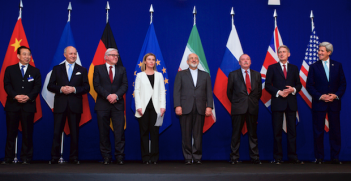Celebrating 70 Years of the United Nations

70 years after the world drew back from the prospect of nuclear war and established the UN Charter, the United Nations has grown and developed new structures in areas not envisaged by the original 50 member nations.
On October 24th the United Nations turned 70 years old. Australia celebrated by bathing dozens of landmarks in the UN blue: a blue Sydney Opera House, a blue MCG and a blue Uluru. There were hundreds more across the globe; a blue Eiffel Tower, a blue Great Wall of China, a blue Empire State Building, even blue Pyramids of Giza. This “Turn the World Blue” campaign was an elegant way to raise awareness of the grand milestone achieved by this iconic global organisation.
Birth of the United Nations
The formal birth of the UN was achieved by the ratification of the UN Charter by the majority of the 50 founding member nations. Australia was one of these and a significant contributor to early UN activities, including being one of the eight nations involved in the original drafting of the Universal Declaration of Human Rights.
The UN has grown and evolved over time. It now has 193 member states, which includes every “normal” country in the world. Although the complexities and disadvantages of a membership-based organisation often lead to slow action, conversely this equally creates stability. The UN is only as strong and fast as its member states allow it to be. It is important to recognise that for each UN “failure” presented in the media, the UN has a vast array of achievements and positive influences not as readily covered in the news.
Peace and Human Rights
World War II had ceased only months prior to the birth of the UN, and the sting of that conflict was still raw. The UN Charter’s objective ‘to save succeeding generations from the scourge of war’ lead to the establishment of the UN Security Council, which has worked as an effective forum and influential body in de-escalating numerous international tensions between major powers. Although we still live in a world awash with nuclear weapons, none have been used in anger since the UN’s formation.
The UN Charter also states that the organisation seeks ‘to reaffirm faith in fundamental human rights’ and ‘to promote social progress and better standards of life in larger freedom’. The successful outcomes of the Millennium Development Goals are but one example of where this has been achieved.
Global Democracy and Justice
The UN membership system is based on equality. The General Assembly provides each member nation an equal democratic vote to influence the direction of the global community and destiny. Empowering all nations in this manner has allowed international law and order to largely prevail over a hierarchy based on mighty armed force. This is reinforced by the UN judicial branch, the International Court of Justice, which is able to independently settle disputes between nations.
International Markets
The UN has proved vital for global trade, and provides the much needed governance structures and frameworks that enable international markets to exist and grow effectively and efficiently. An example of this is the UN International Civil Aviation Organisation, the global standards and regulatory body for airlines across the world. Its activities provide the backbone for international air travel, which in turn facilitates transport of the world’s highest value goods through close to 100,000 safe and secure flights daily. Similar UN special agencies providing stability for business include the International Maritime Organisation, the World Intellectual Property Organisation and the International Telecommunication Union, to name a few.
Global Challenges
The UN is not perfect. And it is aware of its imperfections. There are innate challenges when trying to please 193 member states that deserve to be treated equally. Some systemic challenges can be solved, such as amending the veto powers of the P5 members of the Security Council to improve peacekeeping outcomes, or increasing the transparency of the Secretary-General selection process to ensure the best independent person is selected for the job. There are constant new operational opportunities for improvement, such as improved adoption of modern information technologies and big data techniques to enhance communications and decision-making. Emerging mega challenges, such as climate change, have proved that, if the UN did not exist, we would need to invent it. The UNFCCC convened COP21 climate negotiations in Paris later this month is just one example of the ability and influence of the UN to encourage all countries to come together to find solutions to issues that affect all of us.
In this incredibly complex world and exponential times, the UN has achieved so much worthy of a milestone birthday. All nations and global citizens who have selflessly contributed to the success of the UN over the past 70 years are worthy of our generous thanks.
Matthew Kronborg is the National Executive Director of the United Nations Association of Australia. This article can be republished with attribution under a Creative Commons Licence.




